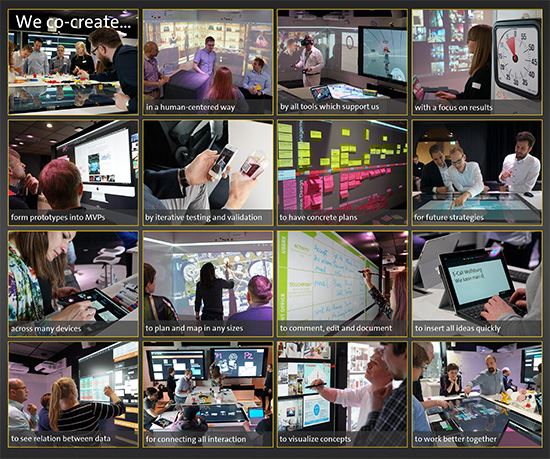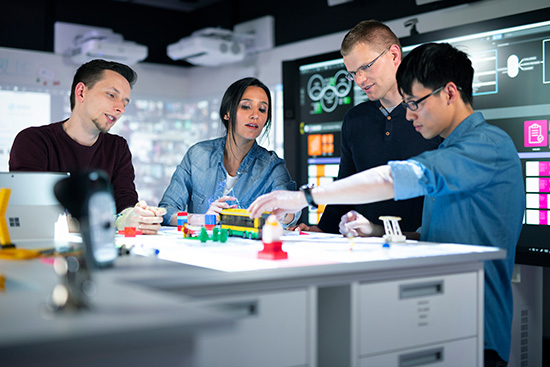Automotive industry is going through a digital transformation and striving to expand its business models into new mobility solutions. Their core product-driven business is expanding to service-orientated business models which requires a new set of expertise and capabilities. Linus Schaaf (M.A.) examines in his doctoral dissertation the possibilities to use service design in business development for human-centered accelerated decision-making by application of digital co-creation.
In his industrial-based doctoral dissertation, Linus Schaaf (M.A.) studies the possibilities and practices on how digital solutions in service design could be utilised and applied efficiently in holistic business development in a multinational business organisation. As a research case, Schaaf examines the development, establishment and use of the 10X - Service Design Lab (10X-SDL) within the former Volkswagen Group Digitalization department.
"Service design has risen in attraction by industry, as a professional practice it can turn complex problems into tangible solutions by co-creation. It is a powerful opportunity to combine business, human-centered design and engineering," Schaaf explains.
In his research, Schaaf studies how service design can be deployed and implemented in a multinational enterprise. The cases conducted have tackled issues in a balance of exploration as development of innovation in new business fields and optimization of existing business processes. As business impact stands at the center of attention, the potential to do any kind of creative work as well as enabling the creation of tangible results has led to the main value proposition "10 times doing".
"The 10X is a co-creation lab that enables the experiencing, design, and testing of services in a human-centered and holistic way by integrating all physical and digital tools needed for the service design process," Schaaf tells.
"It is not just an open workspace in a modular lab, but a framework for facilitation, a methodological toolbox, and an operational model for digital workflow. It aims to accelerate project development and decision-making in a holistic way. Within 10X lab, project developers, participants, and stakeholders can digitally co-create products, services, systems, and strategies," Schaaf describes.

Digital collaboration demands new capabilities
Linus Schaaf's research shows that service design can accelerate business development when applied as digital co-creation. The acceleration in knowledge management reduces the time-to-decision ratio by improving information transparency and access, overall digital workflow, enhanced collaboration, and reduced labor effort, mainly enabled by the combination of digital tool chain and applied methodology.
"However, the use of digital working methods and tools, and human-technology interactions must be actively planned and designed in order to secure the future of the operational business. It is essential to train people to understand and apply the approach, methodology, and techniques of service design adaptively. In addition, digital collaboration requires complexity-managing applications that are ergonomically easy to learn and to use. The designed solutions must be employee-oriented and have a high level of practical relevance to ensure transferability of best-practice to other business units," Schaaf notes.
The COVID-19 crisis has shown how important the digital capabilities of organisations are in order to maintain business processes. The resilient collaboration has been enabled through remote digital and hybrid working formats.
"When the service design process thoroughly considers the organisational environment, it can enable a digital transformation towards a business culture based on digital collaboration and data-based decision-making. An agile organisation has to promote an innovative work organisation including digital enabled space concepts, to achieve results more efficiently and effectively in sense of digital co-creation in colocation or in distance. This will require new roles and competencies to ensure this change process in the organizations in the following years," Schaaf says.
The 10X – Service Design Lab is a further development of the experience-prototyping and service design laboratory Service Innovation Corner (SINCO) at the Faculty of Art and Design of the University of Lapland, and it was developed in close co-operation with SINCO and visual collaboration software company DEON.

Information on the public defence
The doctoral dissertation “DIGITAL CO-CREATION | Digitalization within Service Design: Transformation from analog thinking towards digital doing” by Linus Schaaf, M.A., will be publicly defended with the permission of the Faculty of Art and Design at the University of Lapland on 27 August 2021 at 14 o’clock. The public defence will take place online at: https://connect.eoppimispalvelut.fi/vaitos/
The opponent is Professor Nicola Morelli, Aalborg University, Denmark. The custos is Professor Satu Miettinen, Dean, Faculty of Art and Design, University of Lapland, Finland.
Information on the candidate
Linus Schaaf, b. 1984, holds a Master's degree M.A. in industrial design, specialised in service design, from University of Lapland (2015), a Bachelor’s degree in media design from the Baden-Württemberg Cooperative State University in Ravensburg (2012) and an apprenticeship in media design digital/print (2009).
Schaaf has worked in media agencies and industry as well as an entrepreneur. Coming originally from media design he has developed a particular interest in the strategic use of design and service design in the process of designing systems and platforms, in a fruitful interconnection between theory and practice. He started his industrial-based PhD research in October 2015 at the Volkswagen Group to learn more about the practice of design within multinational organizations. He has worked in close collaboration within the Volkswagen Group with mobility professionals, service and business designers and other disciplines in the field of digitalization and mobility service development.
Contact information:
Linus Schaaf on LinkedIn
Information about the publication
Linus Schaaf: Digital co-creation | Digitalization within Service Design: Transformation from analog thinking towards digital doing. Acta electronica Universitatis Lapponiensis 312. University of Lapland Printing Centre, Rovaniemi 2021. ISBN 978-952-337-266-5. ISSN 1796-6310.
Permanent address of the publication: http://urn.fi/URN:ISBN:978-952-337-266-5